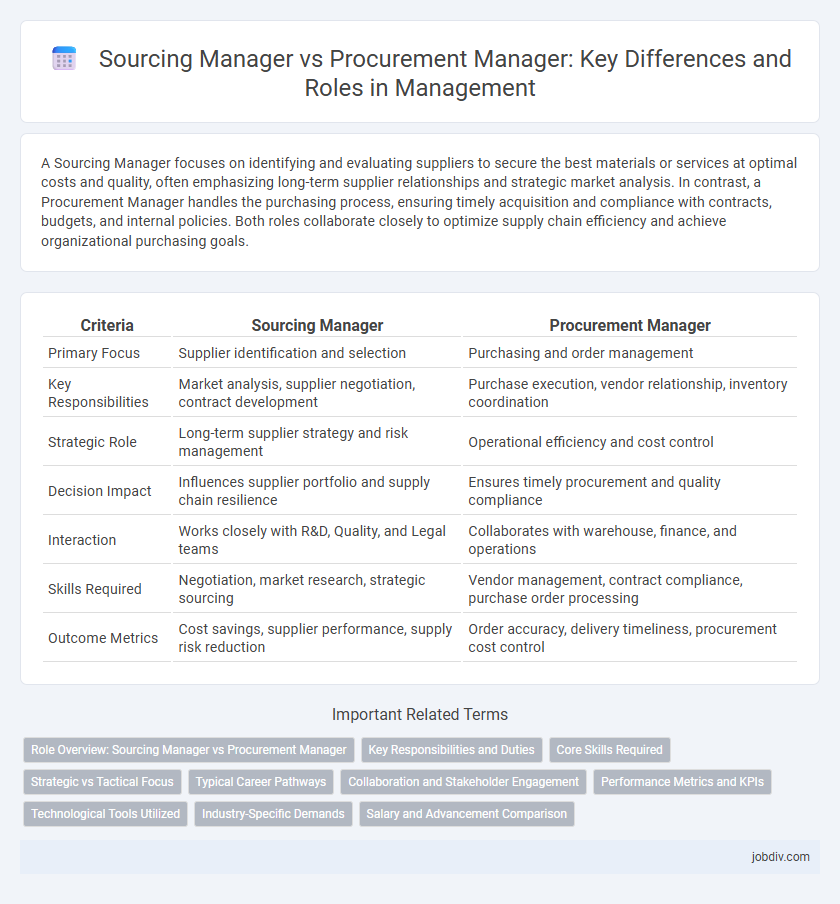A Sourcing Manager focuses on identifying and evaluating suppliers to secure the best materials or services at optimal costs and quality, often emphasizing long-term supplier relationships and strategic market analysis. In contrast, a Procurement Manager handles the purchasing process, ensuring timely acquisition and compliance with contracts, budgets, and internal policies. Both roles collaborate closely to optimize supply chain efficiency and achieve organizational purchasing goals.
Table of Comparison
| Criteria | Sourcing Manager | Procurement Manager |
|---|---|---|
| Primary Focus | Supplier identification and selection | Purchasing and order management |
| Key Responsibilities | Market analysis, supplier negotiation, contract development | Purchase execution, vendor relationship, inventory coordination |
| Strategic Role | Long-term supplier strategy and risk management | Operational efficiency and cost control |
| Decision Impact | Influences supplier portfolio and supply chain resilience | Ensures timely procurement and quality compliance |
| Interaction | Works closely with R&D, Quality, and Legal teams | Collaborates with warehouse, finance, and operations |
| Skills Required | Negotiation, market research, strategic sourcing | Vendor management, contract compliance, purchase order processing |
| Outcome Metrics | Cost savings, supplier performance, supply risk reduction | Order accuracy, delivery timeliness, procurement cost control |
Role Overview: Sourcing Manager vs Procurement Manager
A Sourcing Manager focuses on identifying and evaluating suppliers, negotiating contracts, and developing strategic partnerships to secure high-quality goods and services at optimal costs. A Procurement Manager oversees the purchasing process, ensuring timely procurement, compliance with company policies, and managing supplier relationships to meet operational needs efficiently. Both roles collaborate to streamline supply chain operations but differ in their emphasis on strategic sourcing versus transactional purchasing activities.
Key Responsibilities and Duties
Sourcing Managers focus on identifying and selecting suppliers to ensure the best quality and price for goods and services, conducting market analysis, and negotiating contracts. Procurement Managers oversee the end-to-end purchasing process, including order placement, supplier relationship management, and compliance with organizational policies. Both roles aim to optimize cost-efficiency but while sourcing emphasizes supplier evaluation and strategic planning, procurement centers on operational execution and transactional accuracy.
Core Skills Required
Sourcing Managers excel in strategic supplier evaluation, market analysis, and long-term relationship building to ensure cost-effective and quality inputs. Procurement Managers focus on contract negotiation, order processing, and compliance management to secure timely delivery and adherence to organizational policies. Both roles require strong analytical abilities, communication skills, and proficiency in supply chain technologies.
Strategic vs Tactical Focus
A Sourcing Manager primarily adopts a strategic focus by identifying long-term supplier relationships, market opportunities, and cost-saving initiatives to align with overall business goals. In contrast, a Procurement Manager concentrates on the tactical aspects of purchasing, such as managing purchase orders, supplier negotiations, and ensuring timely delivery of goods and services. Both roles are essential for optimizing supply chain efficiency but differ in scope, with sourcing driving strategy and procurement handling execution.
Typical Career Pathways
Sourcing Managers typically advance from roles in supply chain analysis or supplier relationship management, developing expertise in market research and strategic sourcing before moving into broader procurement leadership. Procurement Managers often begin in purchasing or contract administration, gaining skills in negotiation and compliance, and may progress to oversee entire procurement functions or transition into supply chain management. Both career paths emphasize building cross-functional experience, with growth opportunities in operations, vendor management, and strategic planning.
Collaboration and Stakeholder Engagement
Sourcing Managers prioritize collaboration with suppliers and cross-functional teams to identify strategic sourcing opportunities and optimize supply chains. Procurement Managers focus on engaging internal stakeholders to ensure compliance with purchasing policies and align procurement activities with organizational goals. Effective communication and stakeholder alignment between sourcing and procurement functions drive operational efficiency and cost savings.
Performance Metrics and KPIs
Sourcing Managers prioritize strategic performance metrics such as supplier risk assessment, cost reduction targets, and contract compliance rates to ensure long-term value and supply chain resilience. Procurement Managers focus on operational KPIs including purchase order cycle time, invoice accuracy, and cost savings achieved through tactical negotiations. Both roles require continuous monitoring of supplier delivery performance and spend analysis to drive efficiency and alignment with organizational goals.
Technological Tools Utilized
Sourcing Managers leverage advanced analytical software and AI-driven supplier evaluation tools to identify optimal vendors and streamline strategic sourcing processes. Procurement Managers utilize e-procurement platforms and automated purchase order systems to manage transactions, track orders, and ensure compliance with purchasing policies. Both roles increasingly depend on enterprise resource planning (ERP) systems and cloud-based solutions to enhance visibility, improve collaboration, and optimize supply chain efficiency.
Industry-Specific Demands
Sourcing Managers focus on identifying and evaluating suppliers to meet specific industry demands, ensuring quality and innovation align with sector standards. Procurement Managers handle contract negotiations, purchasing processes, and supplier relationships, emphasizing cost efficiency and compliance within industry regulations. Both roles require specialized knowledge of market trends and supplier capabilities unique to their industry's operational requirements.
Salary and Advancement Comparison
Sourcing Managers typically earn between $75,000 and $110,000 annually, reflecting their focus on strategic supplier identification and long-term partnership development, while Procurement Managers often command salaries ranging from $80,000 to $120,000, driven by their responsibility for contract negotiation and purchasing execution. Career advancement for Sourcing Managers often leads to roles such as Supply Chain Director or Head of Procurement, emphasizing strategic supply network optimization. Procurement Managers frequently progress to senior operational roles like Procurement Director or Chief Procurement Officer, focusing on cost management and compliance oversight.
Sourcing Manager vs Procurement Manager Infographic

 jobdiv.com
jobdiv.com